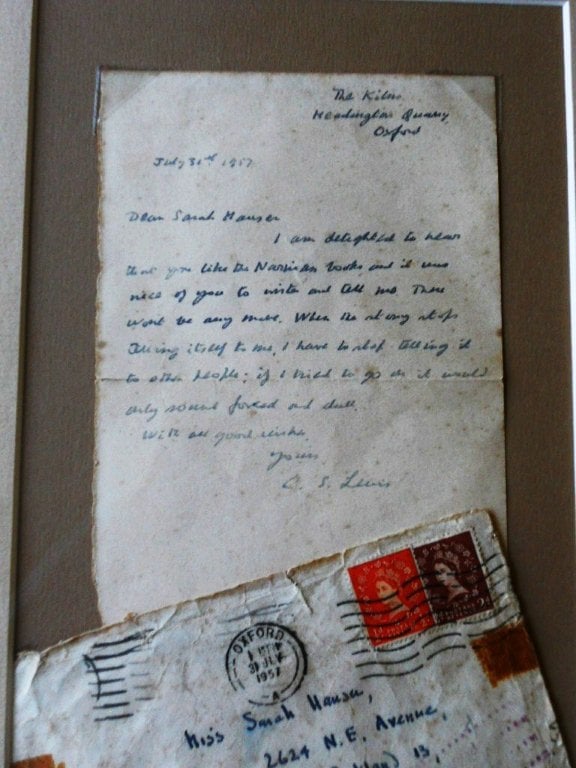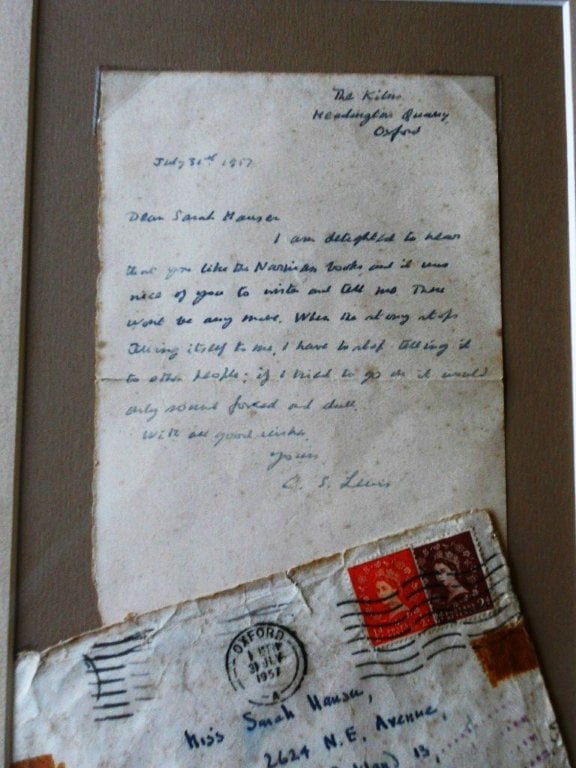Search for topics or resources
Enter your search below and hit enter or click the search icon.
August 27th, 2013 | 3 min read

As the author of the bestselling children’s stories The Chronicles of Narnia, C.S. Lewis inspired many young readers to take up the pen and write him in response. And they did not write in vain.
It is well known that he replied to every letter he received, a task that he normally considered a duty but which Walter Hooper suggests became a delight when corresponding with children. Many of these letters were published in Letters to Children and then later in the three-volume set.
But there are other such letters floating out there that the world has never seen. Like this letter that Lewis wrote to Sarah Hauser on the 31st of July, 1957. Ms. Hauser had written to the Professor asking whether he would please consider writing more Narnia stories, as she had enjoyed them very much. She was twelve when she sent it off and this was Lewis’s reply:
The Kilns
Headington Quarry
Oxford
July 31, 1957
Dear Sarah Hauser,
I am delighted to hear that you like the Narnian books and it was nice of you to write and tell me. There won’t be any more. When the story stops telling itself to me, I have to stop telling to other people; if I tried to go on it would only sound forced and dull.
With all good wishes,
Yours,
C.S. Lewis

Like so many words that C.S. Lewis wrote, this letter had a profound impact—even though it has not been widely known until now. Ms. Hauser went on to become an accomplished storyteller, someone who spends her time delighting children and audiences of all ages with her craft. I met Ms. Hauser during a memorable day at The Kilns, we corresponded afterward, and she was kind enough to give permission to post it.
Lewis’s theory of artistic expression is worth considering carefully, but what strikes me in this letter is his characteristic directness about what he knew must have been disappointing news. Lewis does not hesitate, nor does he think his notions of how he tells story is beyond the child’s mind. He does not "talk down" to Ms. Hauser, but responds with a frankness that indicates respect and equality.
That quality in Lewis's relationship with children extended beyond his letters, though, and is indeed partly why the Chronicles of Narnia have had such perennial and broad appeal. As Lewis wrote in his essay on writing for children:
Everything in the story should arise from the whole cast of the author’s mind. We must write for children out of those elements in our own imagination which we share with children: differing from our child readers not by any less, or less serious, interest in the things we handle, but by the fact that we have other interests which children would not share with us. The matter of our story should be a part of the habitual furniture of our minds….We must meet children as equals in that area of our nature where we are their equals. Our superiority consists partly in commanding other areas, and partly (which is more relevant) in the fact that we are better at telling stories than they are. The child as reader is neither to be patronized nor idolized: we talk to him as man to man.
Judging by his response to Ms. Hauser, Lewis apparently thought such a relationship of equality extended even to the finer points of the nature of the creative vision.
Matthew Lee Anderson is an Associate Professor of Ethics and Theology in Baylor University's Honors College. He has a D.Phil. in Christian Ethics from Oxford University, and is a Perpetual Member of Biola University's Torrey Honors College. In 2005, he founded Mere Orthodoxy.
Topics: